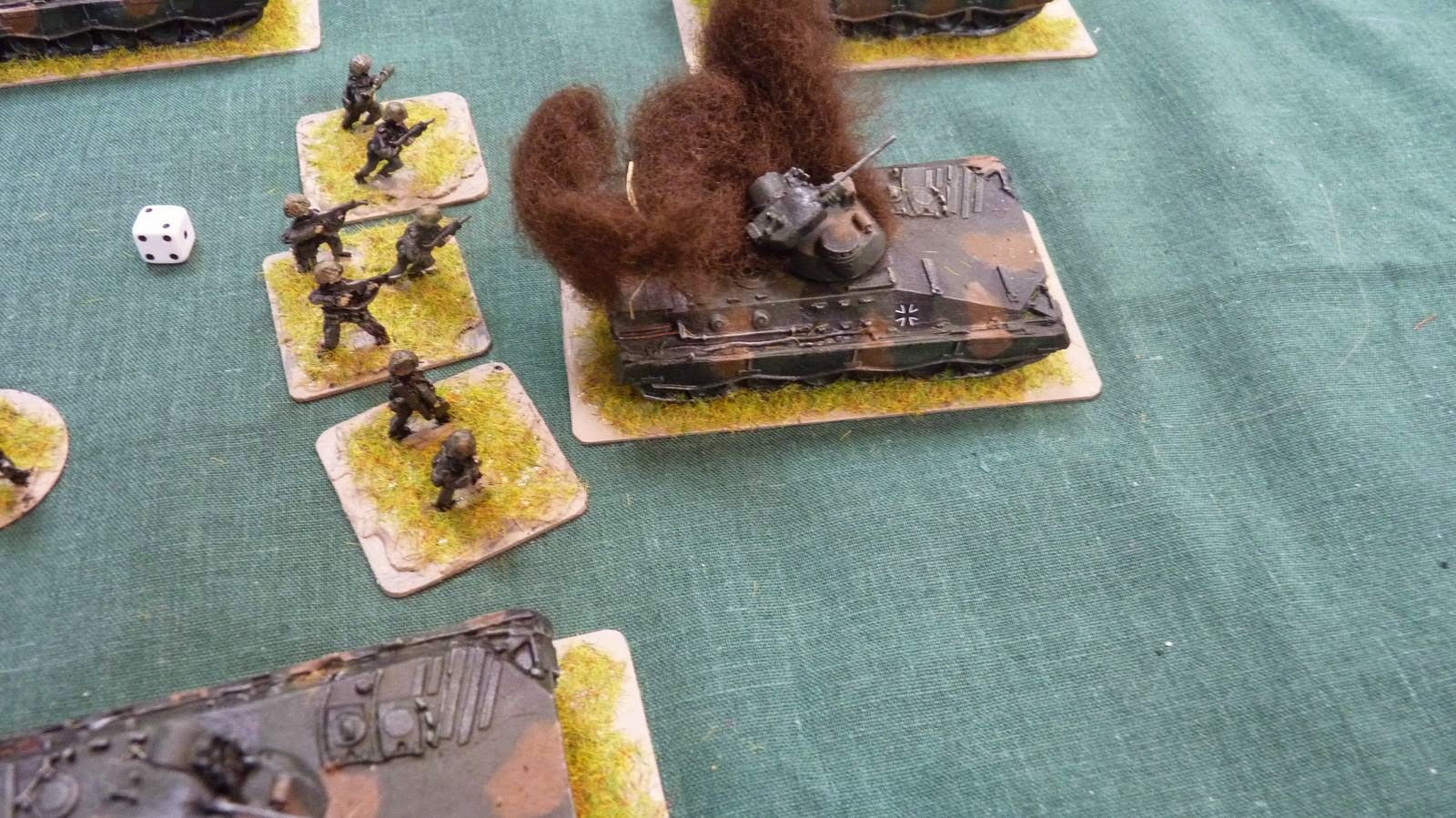IABNM has been taking longer than expected to complete, largely because other things like life have got in the way. There were a few issues with which I haven't been completely happy, and last week I got the inspiration - and time - to sit down and work out some solutions. This set up the following test game.
This is an attack-defence scenario based on a West German counter-attack after Soviet forces had been halted by NATO resistance. The Germans had a Panzergrenadier company in Marders supported by a platoon of Leopard 2s and the battalion 120mm mortars. They were faced by a motor rifle company minus its BTRs, but with a pair of 100mm anti-tank guns (yes they still had towed anti-tank guns in front line units) in support and the battalion Zampolit (commissar) on hand to remind the troops of the historic inevitability of their victory.
The table is shown below from the west. The Bundeswehr had the mission of seizing the crossroads. There were 2 woods, a country hotel and a pair of cornfields with the crops high and ready to harvest.
The Soviets deployed their blinds making use of terrain and to block likely avenues of advance.
Viewed from the Soviet side, the Germans sent one blind along the road but kept the rest to the flanks. A thrust to the south looked likely.
The leading blind in the south seeking to drive through the cornfield was revealed to be the tank platoon.
The Leopard 2s advanced in echelon to leave large trails through a farmer's crops as 2 more blinds following behind went unspotted.
Excellent German optics revealed a Soviet infantry platoon lying in wait on the other side of the field.
Who started to take losses from the tanks' Rheinmetall 120mm guns.
Another blind was revealed to be concealing a platoon in Marders who added to the fire on the Soviet infantry with 20mm auto-cannons.
Defending the perimeter of the pension was another Soviet infantry platoon who opened fire with RPGs on the Marders.
Meanwhile to the north, another German panzergrenadier platoon had worked its way on foot to the eastern edge of the wood where it came under fire from Soviet infantry deployed in the wood opposite.
The panzergrenadiers exited the Marders and added their fire against the facing Soviet infantry.
On the extreme north of the table, between the two woods, the Soviet support platoon joined in the battle with the machine gun section firing on the German infantry as the anti-tank section waited for a target.
The panzergrenadiers had left their carriers just in time as RGPs found their targets and put a pair of Marders out of the battle and inflicting shock on the infantry they had been supporting.
In the centre the other panzergrenadier platoon came off its blinds and poured fire into the wood in front.
The combined firing of tanks, IFVs and infantry was too much for the Soviet motor riflemen a the edge of the field and they ran leaving their dead behind. The Leopards received an 'Assault' order and switched their attention to the Soviet troops in front of the hotel. The Soviets fought back with RPGs and small arms under the leadership of the platoon commander and the Zampolit.
A Spigot operator saw one of the Leopards move around the corned of the field and launched a missile at it. The tank commander reacted by firing his smoke dischargers to instantly screen the vehicle and the missile flew harmlessly past.
Marders moved around the wood to support their infantry in the firefight, producing a dangerous bottleneck. The weight of fire was too much for the Soviet infantry who melted away into the wood.
Close range firing by the tanks sent one Soviet section reeling back.
The Soviets were left with one last card to play if they were to stop the Germans. The Blinds Card was dealt and the 100mm anti-tank guns appeared on the table.
Two well-aimed shots by one gun at the Leopards both missed although the other gun knocked out a Marder. The guns immediately came under fire from the infantry and Marders in the centre inflicting casualties on the crew.
The Leopards pressed forward and swiftly accounted for the anti-tank guns before they could fire again.
Result - a decisive West German victory. The Germans were able to focus their firepower on while the Soviet anti-tank assets were unable to affect the result, firing only briefly and with a lack of accuracy.
The new firing table with amended rules on pinning and suppression were effective and the new tank platoon orders worked. Overall a good test of the rules.





















No comments:
Post a Comment